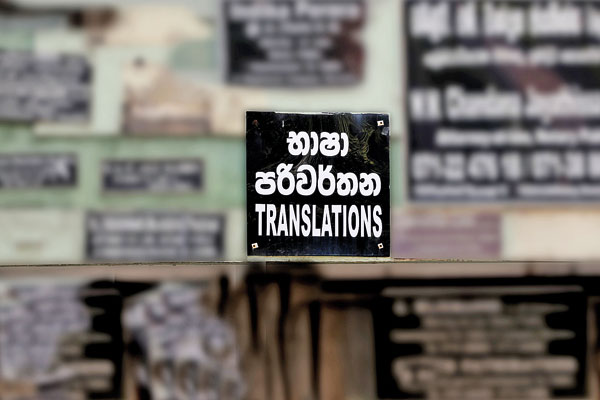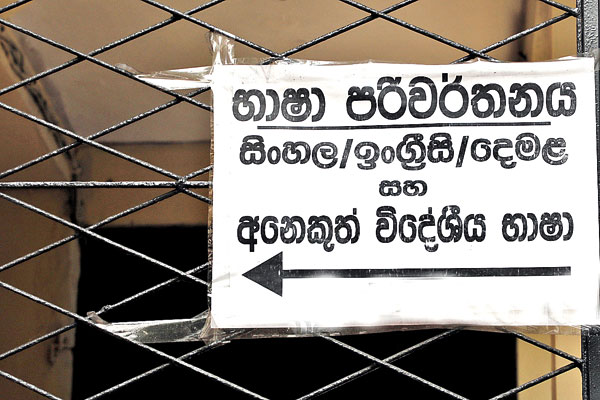News
Lost in translation
View(s):- Govt. services affected by shortage of officers with bilingual skills; poor job prospects and lack of recognition keep recruits away
By Mimi Alphonsus
A shortage of translators, interpreters and bilingual officers has become a major obstacle for those seeking government services.
The Public Administration Ministry acknowledged that despite a recent recruitment drive, 326 vacancies for translators remain unfilled with the majority–200 of them–being for Sinhala-Tamil translators.
The problem is widespread and affects government institutions ranging from police stations and hospitals, courthouses and local government bodies to registrars-general. Consequently, for many citizens, particularly Tamil-speaking people living outside the North and East, it remains difficult to get birth and death certificates in a language they understand, communicate with the police, or have a speedy and just trial in court.
Thangavelu Jayakumar, a private translator who is also a retired court interpreter, said that cases often get delayed for months and sometimes years. “The Court of Appeal is particularly bad because Tamil families who want to appeal a criminal case have to come to Colombo and operate predominantly in English,” he said.

Court cases often get delayed for months and sometimes years due to lack of translators. Pix by M.A. Pushpa Kumara
Mr. Jayakumar gets requests to translate hundreds of pages of briefs and decisions from parties to a case but it often runs into hundreds of thousands of rupees to translate. “Frankly, I am overloaded,” he sighed.
D. Kalansooriya, Chairman of the Official Languages Commission, listed other sectors that are affected. “Ministries are required to release documents in all three languages,” he said. “But because there is the shortage Tamil documents, in particular, get delayed.”
He said that sometimes Tamil majority neighbourhoods have Sinhala Divisional Secretariats–and that even if they can communicate in Tamil, they often produce incorrect documents in Tamil. “The biggest issue is with the incorrect lettering and pronunciation,” Mr. Kalansooriya said, adding, “We have encouraged them to use sworn translators.”
The most significant shortage is in the Sinhala to Tamil category. The Ministry of Public Administration recently recruited over 80 translators. Only 18 of them possessed sufficient Sinhala to Tamil translation skills to meet the necessary criteria.
“There has been a hiring freeze across the government but we were allowed to hire translators,” said an official at the Ministry. “There still weren’t enough qualified people and that is the reason for the shortage.”

Kumudu Gamage, Head of the Kelaniya University’s Translations Department, echoed this. Their degree programmes in five universities accept about 100 students each year but target only English-Sinhala and English-Tamil translators.
“The issue is that knowledge of link language is very low in Sri Lanka so there are not enough school-leavers who can study in a Sinhala-Tamil programme,” she explained. “There is also not enough funding at the moment to expand the programme.”
However, translators point to another issue causing the shortage. Anusha Perera, a translator with the Ministry of Public Security, said that the low pay and high work output is discouraging recruits.
“There is a lot of pressure to finish large, technical documents quickly,” she said. “But it is not possible to do that because I am the only translator.”
The lack of in-service training was also a problem and many translators have chosen to migrate or go into private translation service, Ms. Perera said. “Those who just graduate from the translation programme and do their internships with us start off excited to work. But when they see the reality they tell me they are no longer interested in sticking with the service,” she said.
Chulananda Samaranayake, who has been a translator in the public service for 27 years, said, “We get very little respect even though our job, to bridge the North and the South, is so important.” Several of them said they usually have the worst office space and are frequently disturbed by the loud environment (one said she was placed near the entrance).
There were irregularities in promotions and the service minute hasn’t been updated to give them better benefits. “There is only one promotion available to us and the relevant exam hasn’t been held for decades,” Mr. Samaranayake said. “I did not get my promotion until last year, after I finished 27 years of work.”
There are qualified people but they will not join the service unless a reasonable offer is made, he held. “Translators are the most important but most neglected profession,” he lamented, adding that he writes and translates books to “console his heart”. “Looking back,” he reflected, “I have wasted my time in the public service.”
In addition to the 310 translators at the Ministry of Public Administration, the government also has regulations requiring bilingual officers to be stationed at various government institutions. Unfortunately, this is often not the case.
The Sunday Times contacted 15 major police stations across the country, out of which less than half had a bilingual officer. These included police stations in Tamil-majority areas. This is despite the fact that police are required to take statements in the language of preference.
Worryingly, the health sector is also affected. A doctor from the Nuwara Eliya district who requested not to be named said that, while the vast majority of people in his area are Tamil-speaking, the majority of doctors, midwives, and public health officers only speak Sinhala.
There is no requirement for his hospital to have an interpreter. Problems abound. “There is a language test that all government servants have to do but that is not enough and doesn’t cover the specifics of the profession,” he said. “When the doctor sees the patient they have to rely on attendants or others to translate but that is not easy.”
Labour rooms, in particular, needed doctors who could understand the language of patients, the doctor maintained, adding that when public health officials venture out to educate the public, they make their presentations in Sinhala, even in predominantly Tamil areas.
To make up for the lack of official translators and bilingual officers, many public offices use whoever is proficient or outsource the work. However, translators we interviewed and Mr. Kalansooriya all said there was a high risk of incorrect or shoddy translations.
The Official Language Commission was created to bring Sri Lanka’s government institutions in compliance with language rights as dictated in the constitution. Mr. Kalansooriya pointed to some victories in the last year. For instance, banks were requested to provide translations of loan contracts. On the Commission’s recommendations, the electricity bills are provided in the preferred language. And a pool of private translators, bhashawa.lk, is maintained from which institutions are encouraged to hire translators when needed.
It is clear, however, that in the long term bilingual education must be heavily prioritised to resolve the crisis.
The best way to say that you found the home of your dreams is by finding it on Hitad.lk. We have listings for apartments for sale or rent in Sri Lanka, no matter what locale you're looking for! Whether you live in Colombo, Galle, Kandy, Matara, Jaffna and more - we've got them all!

